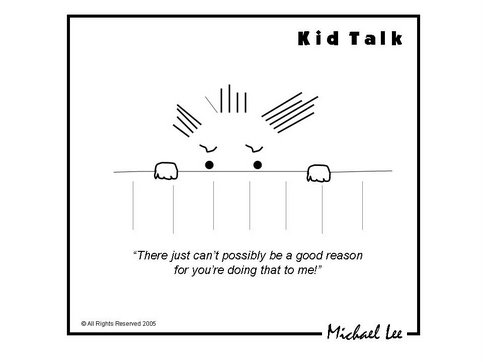

Friday, 3 August 2007
2007 08: MOM-STER IN THE HOME: The ugly spectre of growing child abuse
NST Online. Frontpage. 29/7/07
Mothers and fathers are doing the unthinkable: Abusing their children and scarring them for life. In some cases, they have sent them to an early grave. What drives such insanity? P. SELVARANI and TAN CHOE CHOE examine the social phenomenon that is leaving Malaysians shaken to the core
MOTHERS are said to have been created by God as He could not be everywhere.
But some are committing the ultimate betrayal by abusing their own flesh and blood — their children.
This is a phenomenon puzzling to the authorities and the average Malaysian alike, that the very people charged with raising and nurturing children — parents — are hurting them beyond belief, sometimes to death.
There is no escaping the ugly spectre of worsening statistics: Child abuse cases have increased by 60 per cent in the past five years, from 1,242 in 2002 to 1,999 last year.
It paints a frightening outlook for the future.
Mothers were responsible for 493 of the 1,999 cases of child abuse last year, according to Welfare Department statistics.
Fathers, their children’s supposed hero and protector, came in a close second. They were responsible for 441 of the cases.
Collectively, parents were responsible for nearly five out of 10 cases of child abuse last year.
Police statistics show that of the 26 child murder cases reported in the first five months of this year, five were committed by fathers and two by mothers.
Some of the victims were newborn babies.
At least two out of 10 victims were less than 4 years old.
Those between 7 and 15 made up the majority of reported cases.
Statistics also show that in 214 cases, the boyfriend or girlfriend of the victims had a hand in the abuse.
Other abusers were friends, relatives, step-parents, babysitters and neighbours.
The figures were so alarming that police set up the Sexual Crimes and Children division, or D11, to handle them.
According to the department, the reasons for abuse vary but family problems were the main cause cited (659 cases).
In 116 cases, the abusers were found to be mentally disturbed.
There were also abusers who were alcoholics (83), dadah addicts (81) and those who were abuse victims themselves (28).
Living apart from the family in their early growing up years was also cited as a reason for abuse, especially among parents.
There were abusers who blamed the child for being hyperactive, making it difficult for the parents or guardian to watch over them. Exhaustion led to frayed tempers and in 101 cases, violence.
A small number of abusers cited financial problems, superstitious beliefs and the intention of disciplining children.
To 33 abusers, the fact that a child was born out of wedlock was enough cause for abuse.
In about 10 per cent of cases, no one could identify a reason for the abuse.
Urbanisation may also be a factor as the incidents mostly occurred in more developed states, such as Selangor, Penang and Kuala Lumpur.
"This is a possibility as city dwellers usually work long hours and are generally stressed.
"From our data, higher density areas generally have more reported cases," said Welfare Department director-general Datuk Rafek Reshidullah.
Some 50 per cent of cases reported to the department last year came from government hospitals.
The 24-hour Teledera helpline, a dedicate telephone line to report child abuse, referred only 37 cases to the department over the same period.
"The number is not big but Teledera is very effective, especially in reaching out to those who need advice or immediate help.
"During office hours, the department will handle the telephone calls. Calls outside office hours are routed to the Malaysian Red Crescent Society.
Most cases reported are new cases, said Rafek.
"We have a registry that keeps track of victims and abusers. We know who they are, and repeat incidents are rare.
"However, he said not all abuse cases were reported to the police, with reported cases being the very severe ones.
Once an abusive parent or guardian is referred to the department, a welfare officer will separate the child from him (or her) and place the victim in a temporary shelter.
The parent or guardian will then be counselled.
"We will investigate the case and the findings will be presented to the Children’s Court.
"The court will decide if the child remains with the parent or guardian or is placed in the care of a more fit and proper person.
"In most cases, the child is usually returned to the care of the family, providing the parent or guardian who abused the child is repentant.
"Otherwise, the child may be placed in foster care or, as a last resort, sent to a welfare institution or orphanage.
The sorry episode does not end there. The abused victim may go on to become an abuser.
Mothers and fathers are doing the unthinkable: Abusing their children and scarring them for life. In some cases, they have sent them to an early grave. What drives such insanity? P. SELVARANI and TAN CHOE CHOE examine the social phenomenon that is leaving Malaysians shaken to the core
MOTHERS are said to have been created by God as He could not be everywhere.
But some are committing the ultimate betrayal by abusing their own flesh and blood — their children.
This is a phenomenon puzzling to the authorities and the average Malaysian alike, that the very people charged with raising and nurturing children — parents — are hurting them beyond belief, sometimes to death.
There is no escaping the ugly spectre of worsening statistics: Child abuse cases have increased by 60 per cent in the past five years, from 1,242 in 2002 to 1,999 last year.
It paints a frightening outlook for the future.
Mothers were responsible for 493 of the 1,999 cases of child abuse last year, according to Welfare Department statistics.
Fathers, their children’s supposed hero and protector, came in a close second. They were responsible for 441 of the cases.
Collectively, parents were responsible for nearly five out of 10 cases of child abuse last year.
Police statistics show that of the 26 child murder cases reported in the first five months of this year, five were committed by fathers and two by mothers.
Some of the victims were newborn babies.
At least two out of 10 victims were less than 4 years old.
Those between 7 and 15 made up the majority of reported cases.
Statistics also show that in 214 cases, the boyfriend or girlfriend of the victims had a hand in the abuse.
Other abusers were friends, relatives, step-parents, babysitters and neighbours.
The figures were so alarming that police set up the Sexual Crimes and Children division, or D11, to handle them.
According to the department, the reasons for abuse vary but family problems were the main cause cited (659 cases).
In 116 cases, the abusers were found to be mentally disturbed.
There were also abusers who were alcoholics (83), dadah addicts (81) and those who were abuse victims themselves (28).
Living apart from the family in their early growing up years was also cited as a reason for abuse, especially among parents.
There were abusers who blamed the child for being hyperactive, making it difficult for the parents or guardian to watch over them. Exhaustion led to frayed tempers and in 101 cases, violence.
A small number of abusers cited financial problems, superstitious beliefs and the intention of disciplining children.
To 33 abusers, the fact that a child was born out of wedlock was enough cause for abuse.
In about 10 per cent of cases, no one could identify a reason for the abuse.
Urbanisation may also be a factor as the incidents mostly occurred in more developed states, such as Selangor, Penang and Kuala Lumpur.
"This is a possibility as city dwellers usually work long hours and are generally stressed.
"From our data, higher density areas generally have more reported cases," said Welfare Department director-general Datuk Rafek Reshidullah.
Some 50 per cent of cases reported to the department last year came from government hospitals.
The 24-hour Teledera helpline, a dedicate telephone line to report child abuse, referred only 37 cases to the department over the same period.
"The number is not big but Teledera is very effective, especially in reaching out to those who need advice or immediate help.
"During office hours, the department will handle the telephone calls. Calls outside office hours are routed to the Malaysian Red Crescent Society.
Most cases reported are new cases, said Rafek.
"We have a registry that keeps track of victims and abusers. We know who they are, and repeat incidents are rare.
"However, he said not all abuse cases were reported to the police, with reported cases being the very severe ones.
Once an abusive parent or guardian is referred to the department, a welfare officer will separate the child from him (or her) and place the victim in a temporary shelter.
The parent or guardian will then be counselled.
"We will investigate the case and the findings will be presented to the Children’s Court.
"The court will decide if the child remains with the parent or guardian or is placed in the care of a more fit and proper person.
"In most cases, the child is usually returned to the care of the family, providing the parent or guardian who abused the child is repentant.
"Otherwise, the child may be placed in foster care or, as a last resort, sent to a welfare institution or orphanage.
The sorry episode does not end there. The abused victim may go on to become an abuser.
Subscribe to:
Post Comments (Atom)



No comments:
Post a Comment